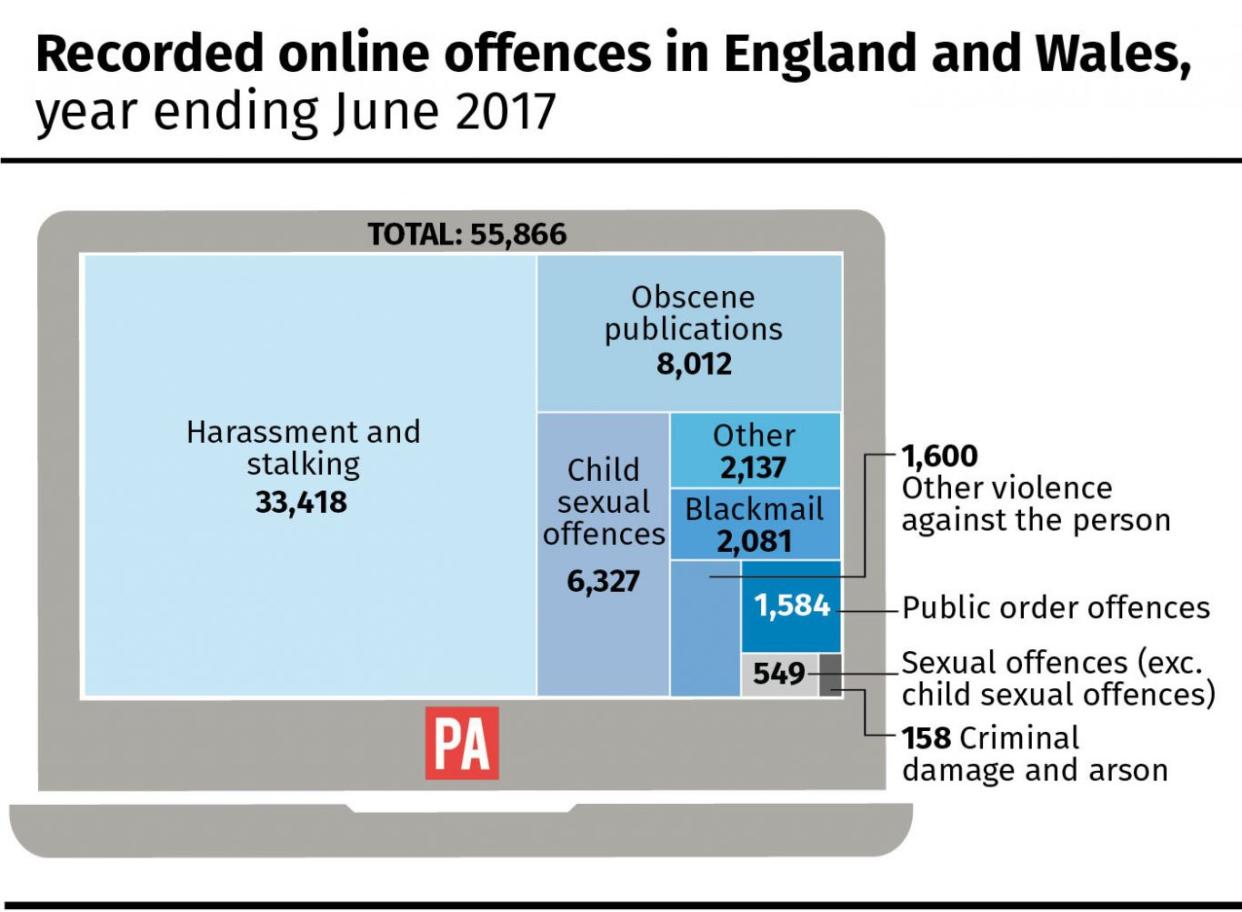Police record average of more than 150 internet-fuelled crimes daily

More than 150 internet-fuelled crimes are recorded by police every day on average as a mounting number of investigations centre on cyber space.
Official figures show forces in England and Wales registered at least some online element in more than 55,000 offences including harassment, blackmail and child sex allegations in the year ending June 2017.
The tally suggests web-related crimes are being logged at a rate of one every 10 minutes.
Fraud and computer misuse are not included in the statistics, as those are recorded centrally, but they give an insight into the digital footprint across other crime categories.

In April 2015, it became mandatory for police to return quarterly information on the number of crimes flagged as being either fully or partially committed online.
The latest findings show 55,866 offences were flagged by officers as online crimes from July 2016 to June 2017.
The count is nearly 20,000 higher than the 36,995 registered in the previous 12 months, although the data sources were not identical for both periods.
Harassment and stalking made up the largest chunk of the online-flagged crimes, with 33,148 in the year to June - meaning around one in seven (14%) of all the offences in the category involved the internet.
The online flag was also applied to 8,012 obscene publications offences, 6,327 child sex offences and 2,081 blackmail offences - accounting for 42%, 13% and 29% of the total numbers of recorded crimes in those brackets respectively.
Other categories with the internet marker included public order offences (1,584), criminal damage and arson (158) and "other violence against the person" crimes (1,600).
Online-flagged offences account for only a small proportion of the total number of crimes registered by forces, which stood at around 4.5 million in the year to June, excluding fraud.
Crime Survey estimated there were 10.8million incidents of crime including experimental fraud & computer crime stats https://t.co/uRXwR6Yw0W
-- ONS (@ONS) October 19, 2017
Notes on the "experimental" figures, which are contained in data tables published by the Office for National Statistics (ONS) earlier this month, suggest the percentage will rise going forward.
They say: "Work is still ongoing with forces to improve the quality of the data submitted in this collection.
"There are some large variations in the proportion of offences flagged by each force depending on crime type and there is anecdotal evidence to suggest that the flag is currently underused.
"Therefore, going forward, with improved identification of online-related offences, the proportion of all offences flagged as being online related is likely to increase."
The figures provide the latest indication of the changing nature of crime.
A report from the probation watchdog on Thursday detailed how social media is being used by young offenders to plan and incite serious offences.
There have been questions over how well equipped police are to confront the shift.
HM Chief Inspector of Constabulary Sir Thomas Winsor warned in an assessment published earlier this year: "Rapid technological change creates new opportunities to investigate crime and apprehend suspects, but forces are all too often overwhelmed by it, leading to backlogs of digital devices waiting to be examined and evidence waiting to be assessed."
Richard Garside, director of the Centre for Crime and Justice Studies, said: "Online-enabled offences make up only a small portion of all offences recorded by the police.
"Looking ahead, the challenge of preventing them and responding to them is only likely to grow. The police are only ever going to be able to play a small part in an effective response."
(function(i,s,o,g,r,a,m){i['GoogleAnalyticsObject']=r;i[r]=i[r]function(){(i[r].q=i[r].q[]).push(arguments)},i[r].l=1*new Date();a=s.createElement(o),m=s.getElementsByTagName(o)[0];a.async=1;a.src=g;m.parentNode.insertBefore(a,m)})(window,document,'script','//www.google-analytics.com/analytics.js','ga');ga('create', 'UA-72310761-1', 'auto', {'name': 'pacontentapi'});ga('pacontentapi.set', 'referrer', location.origin);ga('pacontentapi.set', 'dimension1', 'By PA Reporters');ga('pacontentapi.set', 'dimension2', 'd3256ce4-afe4-4767-8688-20f883971899');ga('pacontentapi.set', 'dimension3', 'paservice:news,paservice:news:uk');ga('pacontentapi.set', 'dimension6', 'story-enriched');ga('pacontentapi.set', 'dimension7', 'composite');ga('pacontentapi.set', 'dimension8', 'paasset:graphic');ga('pacontentapi.set', 'dimension9', null);ga('pacontentapi.send', 'pageview', { 'location': location.href, 'page': (location.pathname + location.search + location.hash), 'title': 'Police record average of more than 150 internet-fuelled crimes daily'});


